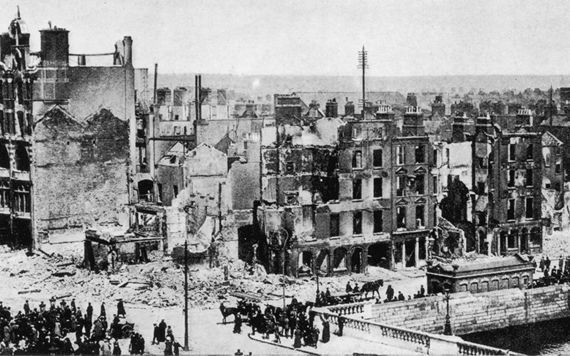FX Coghlan may be a forgotten hero of the Easter Rising, but painstaking research by his grandson reveals an intrepid fighter and master organizer who topped the British authorities’ ‘Most Wanted’ list in the years following 1916.
On the surface, there was no reason to suspect the soft-spoken Cork man of being anything more than your average civil servant. He worked as a clerk in the Land Commission, played handball, went to mass, and lived quietly with his wife and children in Dublin.
However, underneath the veneer of mediocrity, Francis Xavier Coghlan became such a force within the republican movement that the Royal Irish Constabulary spared no effort to hunt him down, only to be outwitted every time.
“They raided the house so often, he dug a tunnel under the bath, about the size of a coffin, and would climb in there while the Black and Tans and auxiliaries combed the place,” says his grandson Gareth Coghlan, who now shares the family home in Rathfarnham with his mother Éilís, seventy-nine, and uncle Dermot, seventy-eight.
“Once they camped out in the garden waiting for him to appear, and it’s said he stayed for nine days in that hiding hole until they gave up and left.
“This went on for about three years from 1918. Sometimes he stayed in safe houses around the city. They treated his family very badly, putting his wife and children out on the streets for hours while they ransacked the house. It was a pretty awful existence, but he put it down to the ‘impunities of being in the movement.’”
Read more
Born in Sheep’s Head in West Cork, FX joined the Irish Volunteers in 1913 and was in F Company First Battalion during the Rising, fighting on Church Street and moving towards the Four Courts towards the end of the week. Deported to Stafford prison, he was released the following June and took a job with the Irish National Aid and Volunteer Dependents’ Fund.
The brainchild of Tom Clarke, who was shot along with James Connolly and Patrick Pearse on the first day of executions in May 1916, the fund was set up by Clarke’s widow Kathleen to help the families of those who’d played their part in the Rising to help pay for food, clothes, education and so on. Michael Collins was Secretary of the organization for fifteen months, and FX was Chief Clerk.
“They brought in staggering amounts of money – £50 here, £100 there,” says Gareth. “There was one donation of £7,000 from the Irish Emigrants Society. Altogether, they raised between £100,000 and £150,000.”
After eighteen months he moved to New Ireland Assurance, which was set up in 1918 in an effort to keep money in the country. He was one of the first agents called on to collect premiums door-to-door.
“This gave him freedom to gather and deliver information for the movement,” says Gareth.
The same year he was elected leader of the Rathfarnham branch of the Irish Republican Army. Todd Andrews, then aged eighteen to FX’s thirty-two, mentioned the fact in his memoir, "Dublin Made Me."
“We got a new company captain,” Andrews wrote, “an oldish man from Co. Cork called FX Coghlan. Of medium build with a striking face, he spoke quietly in his soft Cork accent. He has no ambitions for glory, possessions or power and is quite unwarlike.”
“That was the thing with my grandfather,” says Gareth. “The fact he is a forgotten hero is largely due to himself. He shied away from publicity, yet he was a very influential man at the time. He was a socialist in his own way, one who didn’t believe in owning property, and he treated everybody with respect.
“After all the excitement of the Rising, he worked doggedly to help people who had been part of it. He wrote countless letters on behalf of families who had fallen on hard times, trying to get them some work. And he didn’t do it lightly – he went out and interviewed those people, to find out more about them, what they were good at, and then wrote to his old colleagues like Todd Andrews, who went on to found Bord na Móna, and Joe McGrath of the Irish Hospital Sweepstakes, recommending them for specific jobs.”
FX served as Company Commanding Officer during the War of Independence with the Irish Volunteers and IRA and rose through the ranks to become 4th Battalion Commanding Officer of the pro-Treaty IRA from March 1922 during the Truce Period, and Commandant in the National Army to the end of the Civil War. He left the Defence Forces in 1924 at the rank of Commandant and returned to work for the Land Commission.
When his first wife, with whom he had six children, died from TB in 1927, he later married his boss, who was forced to retire due to the marriage bar in place at the time. They went on to have five children, of whom Gareth’s mother is the second youngest.
“For me, the Easter Rising was a bloody protest,” says Gareth. “Ultimately, if its aim was to overthrow the British, it never had any real hope of succeeding, but what it really achieved was to raise consciousness that a life outside of British rule was possible.
“The message was clear – we could run this country ourselves, make our own mistakes, and do things our way. For that reason alone, the Rising was a momentous occasion and I couldn’t be happier at giving Grandad’s medals an airing at the centenary commemorations.”

Love Irish history? Share your favorite stories with other history buffs in the IrishCentral History Facebook group.
---
From "My 1916: What the Easter Rising Means to Me," available on Amazon © Celine Naughton 2016.
*Celine Naughton is an Irish journalist and author. Her latest book, "My 1916," a collection of personal stories about the Easter Rising, and her novel, "Sink to Slumber," are available online. Her short story, "Dreams of Flying," was shortlisted for the 2016 Hennessy New Irish Writing Awards. She may be reached at [email protected]. Follow her on www.celinenaughton.com, on Twitter @NaughtonCeline, or on Facebook.
* Originally published in Oct 2016, updated in 2023.




Comments